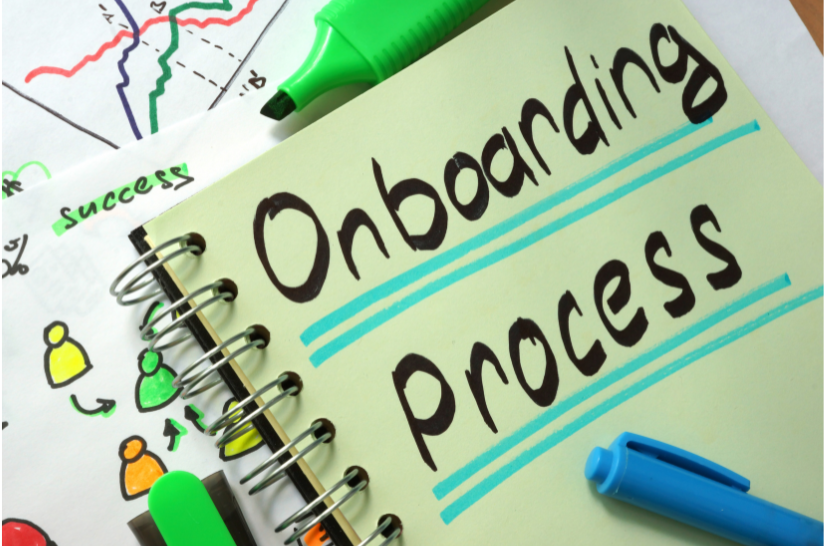A well-structured onboarding process is one of the most critical steps in setting up new agents for success. Unfortunately, many real estate teams overlook this phase, leaving new hires feeling lost, unsupported, and unsure of how to start contributing. The first 90 days can shape an agent’s long-term success, loyalty, and overall productivity. In this blog, we’ll cover the essential elements of a seamless onboarding process that maximizes both productivity and satisfaction for new agents.

Why Onboarding Matters
Onboarding isn’t just about paperwork and office tours; it’s about helping new agents quickly get up to speed and fully integrate into your team. Effective onboarding can reduce the time it takes for agents to become productive, increase retention rates, and improve job satisfaction. When done correctly, it sets the tone for your team’s culture and builds a foundation of trust and mutual support.
The Key Elements of a Successful Onboarding Process
1. Pre-Onboarding: Setting the Stage Before Day One
The onboarding process should begin even before the agent’s first official day. By preparing in advance, you can ensure new hires feel welcomed and ready to hit the ground running.
Best Practices:
- Welcome Package: Send a welcome package that includes a personalized note, branded merchandise, and essential information about the team. This small gesture creates a positive first impression and builds excitement.
- Technology Setup: Ensure all necessary tools, software, and logins are ready before the agent’s first day. This avoids any delays and allows the agent to start working on real tasks right away.
- Pre-Work: Provide new agents with a checklist or training materials to review before their first day. This could include an introduction to your CRM, an overview of your marketing platform, or your team’s core values and mission.
2. First Day: Building Connections and Setting Expectations
The first day is crucial in establishing a sense of belonging and ensuring the agent understands what’s expected of them.
Best Practices:
- Personalized Welcome: Start the day with a warm welcome. Introduce the new agent to the team, give them a tour of the office (if applicable), and make sure they feel comfortable in their new environment.
- Introduction to Team Culture: Share your team’s mission, vision, and core values. Highlight what makes your team unique and explain how the new agent’s role fits into the bigger picture.
- Clear Expectations: Clearly outline what the new agent should focus on in their first week, including specific goals or milestones. This gives them a sense of direction and helps them prioritize tasks.

3. Structured Training Program: Equipping Agents with the Right Tools
Training is one of the most critical aspects of onboarding. Even experienced agents need guidance on how your team operates, from marketing processes to lead management systems.
Best Practices:
- Tailored Training Plan: Create a training plan that aligns with the agent’s experience level and role. This should include a mix of hands-on learning, classroom-style sessions, and self-paced resources.
- Mentorship and Shadowing: Pair the new agent with a mentor who can offer guidance, answer questions, and provide support during the first few weeks. Shadowing top agents is also valuable, as it gives new hires insight into how successful agents handle their day-to-day responsibilities.
- Technology and Tools Training: Ensure that the agent is comfortable with all of your team’s tech platforms. Offer hands-on training for your CRM, lead generation tools, marketing software, and any other systems they’ll use regularly.
4. First 30 Days: Building Confidence and Establishing Habits
The first month is all about helping the new agent build confidence, establish productive habits, and start generating results.
Best Practices:
- Goal Setting and Tracking: Work with the agent to set clear goals for their first 30 days. These could include lead generation targets, listing presentations, or client follow-ups. Track their progress and offer regular feedback.
- Daily and Weekly Check-Ins: Schedule regular check-ins to review progress, address challenges, and celebrate wins. These touchpoints help the agent stay on track and show that you’re invested in their success.
- Team Integration: Encourage the new agent to participate in team meetings, events, and social gatherings. The more connected they feel to the team, the more engaged and motivated they’ll be.

5. Ongoing Support: Ensuring Long-Term Success
Onboarding doesn’t stop after the first month. Providing ongoing support is essential for retaining agents and helping them reach their full potential.
Best Practices:
- Advanced Training Opportunities: Offer continuous learning through workshops, webinars, and access to industry experts. As the agent grows, they’ll need more advanced training to take their skills to the next level.
- Performance Reviews: Schedule regular performance reviews at the 60- and 90-day marks to assess the agent’s progress. Use these reviews to set new goals, address any skill gaps, and ensure the agent feels supported.
- Career Path Planning: Discuss the agent’s long-term career goals and how they can achieve them within your team. By showing that you’re committed to their growth, you increase the likelihood of them staying with your team.
6. Feedback Loops: Continuously Improving the Onboarding Process
No onboarding process is perfect, so it’s important to gather feedback and make continuous improvements.
Best Practices:
- Feedback from New Agents: After the onboarding process, ask new agents for feedback on what worked well and where there’s room for improvement. Their insights can help you refine the process for future hires.
- Incorporate Team Input: Involve your current team members in shaping the onboarding process. They can offer valuable perspectives on what’s most helpful for integrating new agents into the team.
- Adapt to Changing Needs: Real estate is a dynamic industry, and your onboarding process should evolve along with it. Regularly review and update your training materials, technology, and integration practices to keep them relevant and effective.

Common Onboarding Pitfalls to Avoid
While a well-structured onboarding process can set agents up for success, there are common pitfalls that can undermine your efforts. Here’s what to watch out for:
- Overloading New Agents with Information: It’s easy to overwhelm new hires by trying to teach them everything at once. Break down the training into manageable segments and focus on the essentials first.
- Assuming Experience Equals Readiness: Even experienced agents need time to adjust to your team’s systems and culture. Don’t skip over onboarding steps just because someone has years of experience.
- Lack of Personalized Support: Every agent is different, and a one-size-fits-all onboarding approach won’t work. Tailor your onboarding to the individual’s strengths, weaknesses, and learning style.
- Not Setting Clear Milestones: Without specific goals and benchmarks, new agents can feel lost and unsure if they’re on the right track. Establish clear milestones to guide their progress.
- Neglecting the Human Aspect: Onboarding isn’t just about training; it’s also about building relationships. Make sure new agents feel welcomed and part of the team from the start.
The Benefits of Effective Onboarding
Investing time and resources into a strong onboarding process pays off in multiple ways. Here are some key benefits:
- Faster Ramp-Up Time: Well-onboarded agents reach productivity faster, contributing to your team’s bottom line sooner.
- Higher Retention Rates: Agents who feel supported and integrated are less likely to leave, reducing turnover and recruitment costs.
- Stronger Team Culture: A smooth onboarding process reinforces your team’s values and culture, creating a cohesive and collaborative environment.
- Increased Job Satisfaction: Agents who feel prepared and confident in their roles are more satisfied and motivated, leading to better performance.

Conclusion
Onboarding is more than just a formality—it’s the foundation for an agent’s success within your team. By creating a seamless integration process, you set your agents up for long-term success, higher productivity, and greater job satisfaction. From pre-onboarding preparation to ongoing support, every step of the process is an opportunity to build trust, instill confidence, and foster a culture of growth. A well-thought-out onboarding process is one of the best investments you can make in the future of your real estate team.
